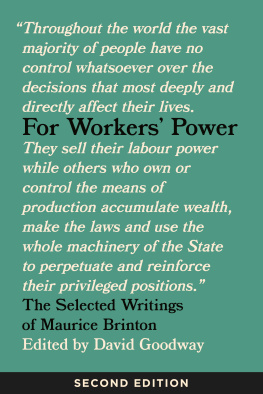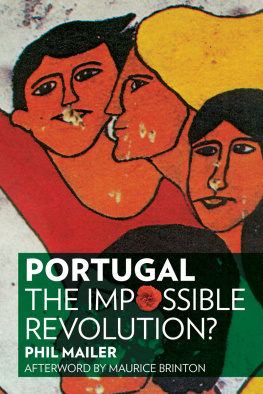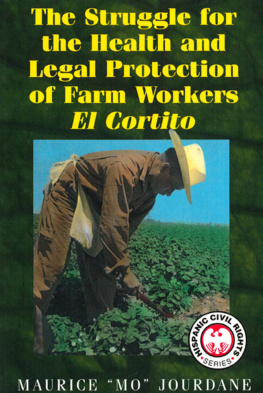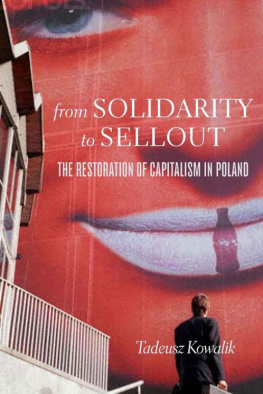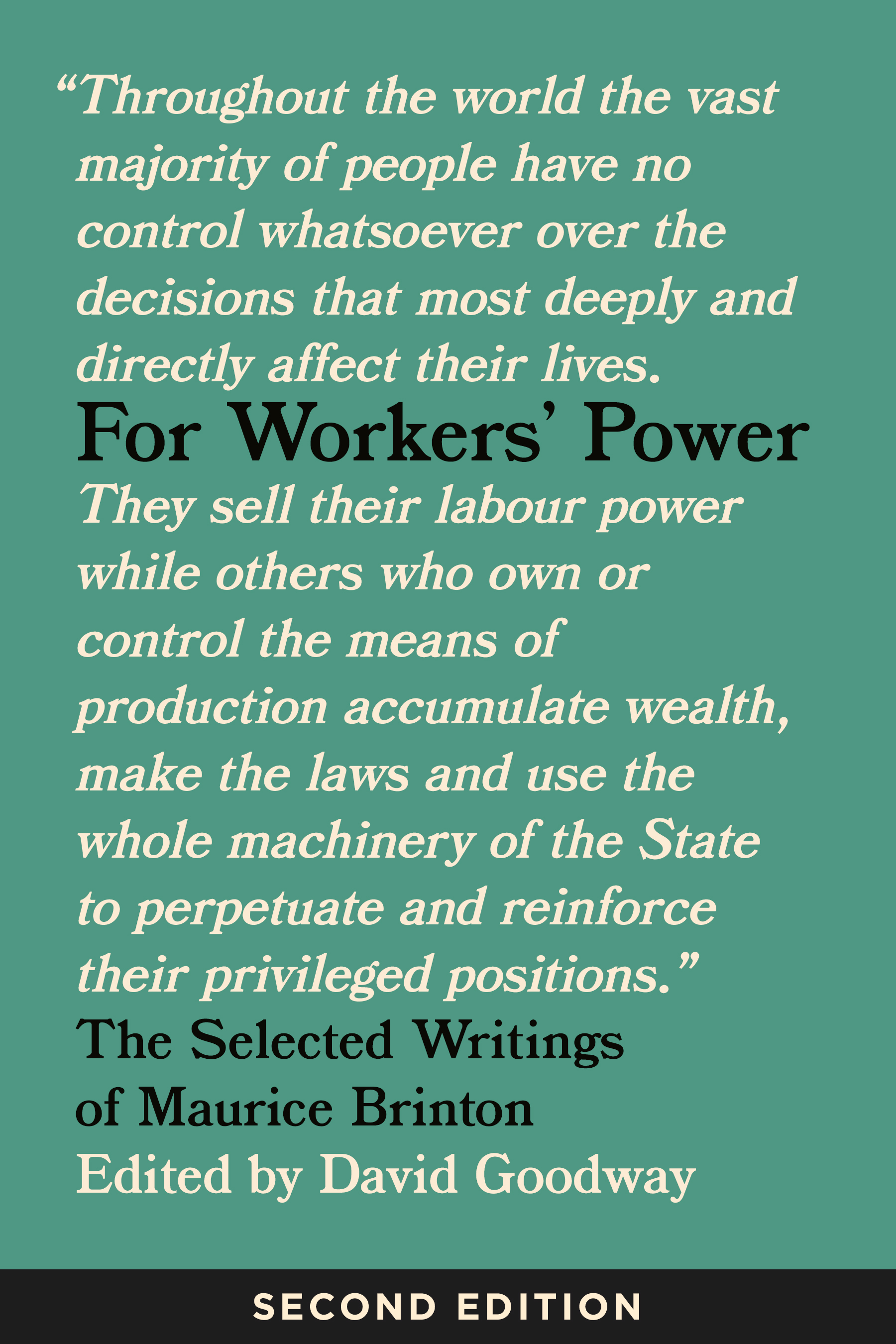CONTENTS
The Identity of Maurice Brinton1
Introduction by David Goodway5
1. Socialism Reaffirmed27
2. The Belgian General Strike: Diary, December 2831, 196031
3. Revolutionary Organization57
4. The Commune, Paris 1871 ( jointly with Philippe Guillaume )71
5. Introduction to Paul Cardan, The Meaning of Socialism 85
6. Preface to Paul Cardan, The Meaning of Socialism 87
7. Introduction to Paul Cardan, Modern Capitalism and Revolution 89
8. The Balkanization of Utopia93
9. For Workers Power97
10. Preface to Ida Mett, The Kronstadt Commune 99
11. The Russian Anarchists Kropotkin111
12. France: Reform or Revolution117
13. France: The Theoretical Implications123
14. The Events in France133
15. Capitalism and Socialism135
16. Capitalism and Socialism: A Rejoinder141
17. A Question of Power147
18. Solidarity and the Neo-Narodniks149
19. Introduction to Murray Bookchin, On Spontaneity and Organization 169
20. Preface to Pierre Chaulieu, Workers Councils and the
Economics of a Self-Managed Society 171
21. Wilhelm Reich 1179
22. Wilhelm Reich 2185
23. The Sexual Revolution189
24. As We See It193
25. As We Dont See It197
26. The Malaise on the Left207
27. Factory Committees and the Dictatorship of the Proletariat215
28. The Ulster Workers Council General Strike225
29. Portuguese Diary 1229
30. Portuguese Diary 2237
31. Introduction to Phil Mailer, Portugal: The Impossible Revolution? 241
32. Introduction to Paul Cardan, Redefining Revolution 257
33. Introduction to Cornelius Castoriadis, History as Creation 261
34. Suddenly This Summer267
35. Castoriadiss Economics Revisited271
Paris: May 1968275
The Irrational in Politics321
The Bolsheviks and Workers Control369
Index481
The Identity of Maurice Brinton
When, twenty years ago, I approached AK Press with the suggestion of an edited selection of the writings of Maurice Brinton, I was excited by their enthusiastic response. In contrast was the negative reaction of Brinton and his wife whom I went to meet in the house in Maida Vale (London), at which I had been a regular visitor in 19656. I was extremely shocked by Brintons physical condition for he was in the grip of an acute state of Parkinsons. I was only allowed to proceed with the book on two conditions: first, I was not to bother either of them with any queries but to ask instead Ken Weller, Brintons long-term friend and political collaborator; and second and quite crucially Brintons real name was not to be revealed.
On the brink of publication AK said that the copyright holder needed to be named. I spoke to Brintons wife about this and her immediate response was Christopher Pallis, saying that at least Chriss actual name would appear once in the volume. One or two eagle-eyed readers noticed this, concluding that he had been obliged to kowtow to the State. Yet this was not so. Copyright could have been assigned to Maurice Brinton or even David Goodway. The decision was exclusively Jeanne Palliss.
Chris Pallis, as Maurice Brinton was always known other than in print died on 10 March 2005 three months after For Workers Power appeared. Its reappearance in a new edition provides the opportunity for its readers to be told something about the real man and why he was determined to hide behind a pseudonym.
Christopher Agamemnon Pallis was born in Bombay in 1923 to a distinguished Anglo-Greek family, of whose intellectual achievements he was immensely proud. His grandfather, Major-General Agamemnon Pallis, was Aide-de-Camp and Head of the Military Household to King Constantine of Greece. Agamemnon Palliss brother, Alexandros, was a poet and a central figure in the demotic literary movement in Greece it was his translation of the New Testament into demotic Greek that provoked the bloody Gospel Riots of 1901 in Athens. Alexandros Pallis in the 1890s had settled in Liverpool, where he was to be appointed Greek consul. His son Marco became a notable Tibetan traveller he was the author of Peaks and Lamas (1948) and an authority on Buddhism; and Marcos sister Marietta Pallis was known as a botanist and ecologist. Alexandros had previously worked in India for Ralli Brothers, the family firm of merchant bankers.
Chris Palliss father, Alec, was general manager of Ralli Brothers in Bombay and when he for his part decided to retire and return to Europe, he chose to live in Switzerland and in consequence his son received most of his schooling there, becoming fluent in not only English and Greek but also French. It was Chriss experiences at the Collge Classique et Gymnase, Lausanne, where the pupils included boys of very different class backgrounds, that aroused his sense of social justice and converted him to socialism. In 1940 the family was able to take the last boat from France and became resident in England.
Chris went up to Balliol College, Oxford, in 1941 to read medicine and instantly joined the Communist Party of Great Britain, but was almost immediately expelled on account of his criticism of its policy on the Second World War. He therefore moved on to Trotskyism and support of the Revolutionary Communist Party (RCP). In May 1945 the RCP contested the (to Trotskyists) mythic Neath by-election and Special Branch reported that Pallis spoke there under the first of his pseudonyms: of apparently N. Kastings (although this is probably a typo and N. Hastings much more likely).
From 1947 (when however the RCP was disintegrating) the pursuit of his medical career led to a complete cessation of political activity for a decade. The previous year, returning from the south of France, he had met Jeanne Marty, a working-class university student (her father was a Parisian postal worker), on the train to Paris, they were married in 1947, and were to be inseparable companions until his death. His clinical studies were at the Radcliffe Infirmary, Oxford, and he afterwards worked as a hospital doctor, first in 194750 for the Government Medical Service in Malaya during the Emergency (the uprising by the Malayan Communist Party) - where his existing interest in tropical medicine shifted to neurology, and later in Cardiff, 19537, where he completed his doctorate on Anomalies of the Cranio-Vertebral Junction. He moved to London in 1957 and the following year took up an appointment as consultant in neurology at the Hammersmith Hospital, becoming also a lecturer in the Royal Medical Postgraduate School, University of London. Here he was to work until his retirement in 1982 as Reader and Head of the Department of Neurology.
On arriving in London he had made contact with the group that was to become the Socialist Labour League (SLL). In 1960 Chris, as a member of the SLLs national committee, took part in the expulsion of a group that contained Ken Weller, but within several months he too had seceded along with the SLLs industrial organizer, Bob Pennington (later revealed as a police spy, Jeanne Pallis told me). Chris was already familiar with Socialisme ou Barbarie and together with Weller, Pennington, more ex-SLL members and some other dissident socialists formed, on the basis of the French journals critique of Bolshevism, the libertarian Socialism Reaffirmed group, which was to be renamed Solidarity.

